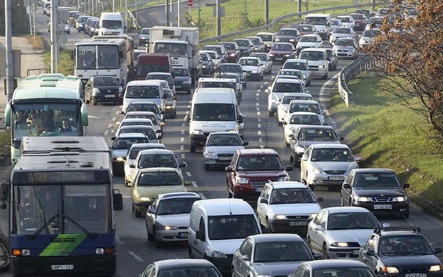
Congestion charge returns to agenda of city's left-wing leadership
Motorists are once again in the crosshairs of Budapest's left-wing city administration. The deputies of Budapest Mayor Gergely Karacsony have repeatedly spoken about the introduction of a congestion charge in recent days. The municipality of Budapest has been planning to slap a penalty fee on motorists for a long time, as our news agency reported on last June. At the time, the municipality denied such intentions, but now the topic is back on the table. The plan was presumably set aside for a few months ahead of the parliamentary elections.
Motorists are once again being targeted by Budapest’s leftist city management headed by Gergely Karacsony with the municipality working to find ways to impose new charges, the Hungarian news portal Origo writes. In recent days, Mayor Gergely Karacsony’s deputies made statements in turn talking about measures aiming to restrict traffic. On 14 June, Deputy Mayor Gabor Kerpel-Fronius, politician of the liberal Momentum Movement, elaborated on the introduction of a congestion charge on a Hungarian news channel. He acknowledged though that currently there was a legal obstacle to this, as the Left lost the elections on 3 April and implementing such a measure fell outside their powers.
Nevertheless, we want to keep this topic hot until the end of the term. In general, we want to talk about the effects of high levels of harmful emissions from vehicles using the roads in the capital have and what we can do about it. Also about the volume of traffic in the capital and what we can do about it. By the way, the mayor’s programme also included such proposals. In the programme Budapest 2.0 prepared by Momentum, the party I represent, we proposed the introduction of what we called a distance-based tolling system,
Origo writes, quoting the words of Gabor Kerpel-Fronius.
Talk of introduction of a congestion fee returned when Deputy Mayor Kata Tutto, representing the Hungarian Socialist Party (MSZP), announced that Budapest would join the Cities Energy Saving Sprint initiative launched by Brussels. The EU initiative includes car-free zones and days, among other things, but Ms Tutto also called on Budapest residents to reduce their consumption as a means of saving energy.
We would like to ask the population and Budapest residents in particular to get involved and to think over carefully where and how they could use a little less energy. By using their cars less, by rethinking their heating, cooling and cooking habits at home. So everyone should check how much energy they use and find ways how to reduce it,
the leftist deputy mayor said on a radio programme on 9 June.
The recommendations in the Brussels initiative include, for example, urban agglomerations switching off street lighting at night. The Cities Energy Saving Sprint encourages municipalities and regional governments to reduce their energy consumption in the summer, ahead of the heating season. These steps are aimed at making EU member states independent of Russian energy sources, Origo recalls.
Gergely Karacsony’s other deputy, Anett Bosz, also called for the reduction of car use in a news channel programme on 13 June.
“I would consider it a great step forward, by the way, to have incentives that would push Hungarians to leave their cars behind and use public transport more often,”
Mr Karacsony’s deputy from the DK (Democratic Coalition) party said.
The introduction of a congestion charge has long been on the table in the left-wing city administration of the Hungarian capital, presumably only put aside for a few months because of the parliamentary elections held on 3 April this year. The voting brought another two-thirds victory for Fidesz-KDNP, which has been in power for 12 years. As V4NA reported last June, citing a Brussels informant: Gergely Karacsony and his colleagues have been planning to introduce a congestion charge in the capital for a year. Budapest’s traffic almost collapsed last June, when several major routes were closed at the same time, the renovation of the Chain Bridge began, new bus and cycle lanes were built, and the existing, underused cycle lanes were not returned to motorists. This has led to massive traffic jams in the city.
According to the Brussels source, this was not a coincidence at all, as it was intended to prepare the grounds for the introduction of a congestion charge. Citing the demands of pseudo-civilian groups banning together against the conditions, the city administration wanted to make motorists in Budapest pay under the pretext that they were doing so at the request of the people of Budapest. V4NA had already asked the Mayor’s Office last June, but their brash response labelled the questions “a provocation.”
Budapest’s climate strategy also includes the introduction of a congestion charge. The document foresees an emissions-based charge, as does the Environmental Protection Programme of the Hungarian capital for the period 2021-2026. However, many pointed out at the time that
the congestion charge in Budapest would in effect be a tax on the rural population,
such as commuters from the suburbs or the countryside, visitors coming to Budapest for shopping, excursions, theatre, or medical treatment. But Budapest residents who commute from outer districts to work in the city’s inner districts would also be affected by the congestion charge.

